The creators of The Outer Worlds on learning to make better RPGs
Our full interview with Tim Cain and Leonard Boyarsky about Fallout, making mistakes, and Obsidian's RPG heritage.
I recently visited Obsidian Entertainment to see the studio's new RPG The Outer Worlds, which I called a blend of Firefly and Fallout. It may look like the space cowboy version of Bethesda's recent Fallout 3 and Fallout 4, but its roots run deeper than that: lead developers Leonard Boyarsky and Tim Cain created Fallout together in the 90s, along with other famous PC RPGs like Vampire the Masquerade: Bloodlines.
You can read a lot more about The Outer Worlds
in my feature, but I also talked to Tim and Leonard about their careers making RPGs, and how that experience and working at Obsidian is affecting this new game. Here's what they had to say.
Wes Fenlon, PC Gamer: Tim, did you sort of have an inkling of what this game was going to be before Leonard came over to Obsidian from Blizzard, or did you form the idea together?
Tim Cain: I had no idea what it was going to look like. We had not picked any art style. We knew it was going to be sci-fi.
Leonard Boyarsky: Obsidian asked Tim to make a new IP and Tim reached out to me, because we complement each other really well in terms of what we're good at and what we're not good at, and just kind of went from there. We knew going in that we wanted it to be a space opera-y kind of thing. We hadn't really done that before. We'd done post-apocalyptic, we did Vampire, and Arcanum, steampunk fantasy.
Even before we had the art style, I definitely knew that it was going to be another one of these kinds of alternate history, weird things that most other people wouldn't try to tackle. I think it's more prevalent now, but back when we did Fallout, people didn't quite get the 1950s post-apocalyptic thing right out of the gate. They weren't quite sure what to what we were talking about.
Tim: We like to do things like… with Fallout, we said 'what if the transistor never got invented?' People would've stayed with vacuum tubes and then boom, all this stuff happened. For this one, we're like, 'what if space travel was possible
this way.' Then it's like, we'd probably have these kinds of colonies, and everything would be really expensive so governments and big corporations would have to pay for them, and then everything just starts steamrolling from there. Then Leonard did a lot of work on story, and I like playing around with system mechanics, and we try to make sure they mesh.
PC Gamer: When you thought about the games you've made before, what did you say at the beginning of developing this game that you wanted to do differently? Not just the theme, but the guiding tenants of the design, of the story you wanted to tell, what the player was going to be able to do in the game. What did you want to do that you hadn't done before?
Tim: When we made Fallout, I was always going 'in the main quest, you always have to be able to fight your way, talk your way, or sneak your way through. Since then all this stuff has happened with companions and people love having companions. We're not doing romance because, well, that's been done. But I wanted to explore the things a player can do with his companions that still felt like the player's the hero, but make the companions much more integral to his path through the game. And that's what that fourth path came up, the leader idea.
There are skills that support it. The way you interact with your companions changes, and it's just a really interesting path through the game. It's more of a jack of all trades. Once you switch out companions you're good at different things. That is a really fun character to play because you're like, 'hey, let's go try and talk to these people.' You do it and fail. 'Okay, you two go back in the ship. I'm going to load out these two combat guys and we're just going to go kill everybody.' You can't do that with other characters. You can't just change your build on the fly like that.
Cain and Boyarsky's approach to RPG design hasn't changed drastically since Fallout in 1997.
Leonard: From a story standpoint, every time we do a game, we're just trying to get better. You learn way more from failure than you do from success and we've had a lot of, uh, learning experiences. But yeah, I've always strived to have characters that no matter how ridiculous the situation is or even how ridiculous their motivations might seem on the surface, that have some sort of a depth and reality to them. Even if they feel silly, there's a heart to them. So to me it's all about just finding new and better ways to tell a story.
Tim: None of our villains ever feel like they're just, 'I'm evil and twiddling my mustache for the fun of it.' They always think they're being good or they know they're being evil, but there's ultimately a good goal or they feel like there's no other choice but to do this. So sometimes you're like, 'you know, you're right. I think I want to be evil with you.' It's an interesting thing because you find yourself feeling sympathetic for some of the evil characters.
Wes: It's kind of obvious from seeing the game that it's not gonna feel like a Star Wars light side/dark side, or a Mass Effect Paragon/Renegade kind of game.
Tim: It's all grey side.
Leonard: That's something we always do. We can't seem to get away from it. Not that we want to, but that's what appeals to us. The ability to not only be able to make your own decisions and make what choices you want to make, but also not having a clear-cut 'what is the best choice here.' And so that's where players have to start really thinking about 'what do I want to do as a character' as opposed to, 'well, you know, I always play the good guy, so I'm always just going to pick helping people.'
Well if you're helping this guy, is that actually the good thing to do? It just promotes some more thinking on the part of players who care to contemplate that. There's certain people on our team who just like to run around shooting people, which is fine too. That's a valid way to play. And that needs to be fun too.
Tim: That's why we always have slides in our games at the end, and we're going to do it in this one too. It's saying, you know all these things you did while you played? These were all the effects you're going to have. And it often makes people go, 'I want to replay the game. I didn't realize I was being so much of a jerk.'
On Arcanum, Cain & Boyarsky learned not to try to do *everything* in one game.
Wes: I want to go back to something you said a minute ago. Not to twist the knife too much, but do you have any examples of things that you would consider a failure, or something that didn't turn out the way you hoped, that have informed you learning and being better at writing or designing for Outer Worlds?
Leonard: We were very, very fortunate in the original Fallout. Every time we seemed to run into a problem, the solution was better than what we had before. The way to fix this problem, or 'Oh my God, we're running out of our resources to make this' or whatever it was, we'd figured these things out. On every front that seemed to happen. Or just random inspiration of like, oh, this should be 1950s, post-apocalyptic instead of the Road Warrior rip-off game we were making like two months ago. Those things generally don't work out, so in a way we started out learning the wrong lessons because we're like, 'well, it'll just work out like that every time.' Going from there to Arcanum, we just threw everything and the kitchen sink into it, which is a sophomore curse when you're making games. 'I'm just going to make this game everything.' So that's when we learned to be more focused.
Vampire had its own challenges. I think some of the stuff in Vampire was a little bit more linear. But we looked at, 'oh, if we do some of these things, you still have choices, but if we tweak some of these things that enables us to tell deeper stories.'
Tim: For me, Fallout had great story and characters and Arcanum did too. He went to go make Vampire and I was making Temple of Elemental Evil. And I said, 'I can do that myself.' And that's when I learned I can't do story and characters. That game shipped, and it's a great D&D simulator, but the story and characters aren't very good. And that's one reason why when Feargus said 'Hey, do you want to make another IP here?' I'm like, 'yeah, but I need someone who's really good with story and character.' That's something that obviously 15 years before I didn't say. So you have to sometimes do something and learn. I think now I know a lot more about what I'm good at and what I'm bad. Where 20 years ago I'm like, 'Maybe I'm good at everything!'
Wes: This is your first game together at Obsidian with a studio full of RPG developers. They've been making these kinds of games for a long time. How has working with the team here fit in with you leading the project?
Tim: I started here in 2011, and worked on Stick of Truth and the first Pillars of Eternity. So I already kind of knew how things worked at Obsidian, and about a third of the people who work at Obsidian were from Black Isle, which we worked at together.
Leonard: For me coming here from Blizzard, Blizzard was a great experience. But coming here was like, 'oh yeah, I remember this is how I used to make games' because Troika and Obsidian both sprung out of interplay and Black Isle. We both had the goal of maintaining that vibe that Interplay had back in the day, which was great. So coming here was like a homecoming for me and a lot of these people I knew back 20 years ago, but there's also people who worked at Troika here with us.
Tim: I remember my first day here, starting at a new company and already knowing about a third of the people. It's weird because it's a company that you've never stepped foot in before, but a lot of these people were people you've worked with in the past.
The Outer Worlds is a long ways from Fallout's browns and greys.
Leonard: They've been, for the past 15 years, refining their process. They have one of the best dialogue tools I've seen. Back in Arcanum and Vampire we were using Excel spreadsheets to write our dialogues. Very powerful tools, but very difficult to use at the same time. They've developed a lot of practices that make the kind of games we want to make easier to make. We don't then have to come in and say, 'Oh, here's how we make RPGs' because we all make RPGs the same way, and that's not the case when you go to other places. Every company has their own unique way of making games. It's weird coming into a company and it's like, oh yes, this is exactly how I make it.
Tim: Yeah, I can't overstate that idea. The tools. All of our RPGs have branching dialogues based on lots of conditionals and lots of text. Their tools here just handle that incredibly easily. And then when you want to localize them you literally press a button and all the strings have been sent it to the Italian localizer, all the strings have been sent to the Spanish localizer. It's the kind of thing that 15, 20 years ago we were pulling our hair out trying to do, and here it's just press this button, it's automated. It's really cool.
Leonard: We also don't have to spend energy convincing the people of the company that the type of game we want to make is good. We all come from the same place, Black Isle, Interplay. The fact that we don't have a voiced protagonist, you know, that wasn't something that was even really a discussion point. Everybody here was like, 'Oh yeah, we know exactly why you'd want to do that because it gives you more options as a player,' which is one of our key values when we're making a game like this, and it's one of Obsidian's key values. They want you to be able to play the character. We want you to be able to play the character.
Tim: A lot of other companies are moving away from that.
Wes: One of the things I thought was interesting in the dialogue you showed: if you don't have a high enough intimidate skill, you'll still show the option there to make the player go, 'oh, I wish I had that.' Are there cases in dialogue using one of those skills, like intimidation or persuasion, where it fails if you're not at a high enough level?
Tim: No, it will always succeed if you're high enough level. One reason we show when you're close is you could always take a drug that improved that skill. You could run back to your ship and get a companion that can improve the skill or you can say, 'wait, I'll be back.' You'd go up a level, put all the points into that skill, and come back. So you have all these options if you're really close. That's why I like it.
Leonard: When you get to major story points or major turning points in the main story arc, nine times out of 10 to get into the place where you can start using your dialogue skills effectively, you have to have an extra piece of information, maybe have done research on the character, find that item that they've always been looking for because you've talked to people and you find that out. It's not just a simple matter of like, 'I'm going to put all my points into dialogue skills and then whenever I talk to these guys, I get those options.' Once you get those options, they'll get you to where you want to go.
To answer one of your previous questions, this is maybe something we have learned, over the years. We used to do dialogue where you had to pick the right choices all along this path to open up the [skill-based] dialogue choices, and then you have to pick the right dialogue ones, and it's just like 'I put all my points into dialogue and if I blow this, I'm screwed, because I'm going to have to end up fighting this guy.' So we wanted to make it still feel challenging. It still felt like you were making choices, but a much more directed form of that. So you don't have to get every decision right to get into the right place to be able to pick the right dialogue skill, if that makes sense.
Your spaceship will serve as a home base, much like in Mass Effect.
Wes: I think a lot of people will see shades of Mass Effect in Outer Worlds. In Mass Effect you would go to a planet, do a whole hub and then you leave and you probably wouldn't go back to it if it wasn't like the Citadel. How are the explorable spaces in this game going to compare? It seems like you're gonna be returning to places a bit more. You're spending more time in different areas of these two planets?
Tim: You're returning to the planets a lot, but going to different areas.
Leonard: And it just depends how you want to play it. What we showed off in the demo, that's a fairly large area. You could go through there and spend a whole bunch of time exhausting everything in that area. I don't know if there's anything that sends you back to that specific area, but in other places we do have things that'll send you back so you can see how your choices have influenced the outcome. Once again, it's the open-endedness of letting you play how you want. If you're on a main quest and you're like, 'oh, I want to get here so I can get over to this place, maybe I won't spend all the time like exhausting every corner of this map.' It feels a little bit more open-ended, or at least we hope that's what it will feel like to players.
Wes: Is there a pacifist route through the game? Is it possible to get through it without shooting anybody?
Leonard: We... don't know yet.
Tim: If there is, it's going to be very hard. We'll probably also make the rule that it doesn't count if you kill a robot. We actually say the robots aren't sentient in our game and people are like, 'what do you mean by that?' So we started questioning. Are they sentient in Star Wars? There are times when they switch off a robot or they buy and sell them, and if they really are sentient, it adds a really dark twisted humor to it. They're all slaves.
Leonard: It's not even a question in most of the cases in our world, it's obvious these things are just mechanical non-thinking automatons. That might feel like a cheat to some people, but we think it's completely valid that if I'm running around just killing robots, then I'm still technically a pacifist because I'm not killing a living sentient being.
Wes: A very PC question here. Have you thought about mod support for the game? If you look at Skyrim, Bethesda's other RPGs, mods add an immense amount of longevity to them.
Tim: We have talked about that. Because we're using Unreal we're kind of limited to what kinds of things people are allowed to mod. Some things Unreal tucks away, some things they don't. We're certainly not going to prohibit it.
Leonard: From a philosophical standpoint that's something we would like to eventually support. We're not shipping an editor with the game or anything like that. And as Tim said, we need to have further discussions with Epic about, if we were to eventually give an editor out, what could we include.
Mod support? Here's hoping.
Tim: One of our level designers wrote one of the most popular mods for Skyrim, so obviously it's in our DNA.
Leonard: What you said is completely true. I mean, we understand that is one thing people want from these types of games. But as with a lot of other things, you know, we're starting an IP from scratch. We're starting with a brand new engine. We've got a lot of people on our team have been here for awhile, but there's a lot of people on our team who are new. So all these things together, we really are just concentrating on making this great RPG experience. We want to do all that stuff. We want people to be able to do that stuff, we want all the bells and whistles, but our very first step on that road is to make a game that hopefully people will love. Then we go from there and see where we can go.
Wes: For a lot of these kinds of games, like Fallout, a lot of times people really love the RPG systems but combat sometimes falls by the wayside in terms of how good it feels to shoot a gun compared to a first person shooter. Can you talk a little bit about the design of the combat, the work you're doing on the feel of the melee weapons and the different types of guns.
Tim: We examined a bunch of first person shooters, we saw talks given at GDC about first person shooters. Private Division got us in contact with a subject matter expert on first person shooter combat and he reviewed our game and gave us a lot of great tips. We want it to be fun, but then we wanted to take some elements of the first person shooter and extract them into RPG skills so that if you're not a twitch shooter, you can up your skills and feel like you're good. I think we have managed to straddle that.
A good example of what I tell people, our melee just feels really good. We have good heft, good swing, good inertia, good knockback on people. Good impact when you hit them. But the actual damage your weapon does is dependent on your melee skill. There's a range that a melee weapon does and as your skill goes up the minimum goes up as well. That's the kind of thing that feels good, and it feels like you're getting better at it. It doesn't feel like you're missing. It doesn't feel like you're not having the impact.
Leonard: Several of our games have had the comment 'you know, the RPG stuff and the story is excellent. The combat's... okay.' If not worse, like, 'well you just gotta deal with the combat because the rest of it's so cool.' We did not want people saying that about this game. We wanted people to have fun if they wanted to focus on combat, but at the same time, this is the main thing we want people to be able to do: play it as an RPG, make the choices, and have fun combat. So we had to balance those things, which is what Tim's talking about. Extracting some of those shooteresque things and putting them into your skills...
We don't want to sacrifice either side. Obviously we're not trying to be like, 'if you play this as a shooter, it's going to be the best shooter out there.' But that doesn't mean that we can't have the aim of having a fun combat experience at the same time as having a great RPG.
Wes: Are there any other forms of interactivity in the game, beyond combat and talking to characters? You showed a really brief lockpicking segment that seemed like it was just, hold a button and if your skill is a high enough threshold, it works. Are there puzzles or minigames, things you're intereacting with in the world?
Leonard: We originally talked about lockpicking minigames or hacking minigames. There's a couple different schools of thought. Some people here believe that they have yet to run into one of those types of minigames that is actually satisfying to play over and over and over again. And, you know, once again, we're starting from scratch. If I want to play a stealth character who lockpicks a lot, if I don't like the kind of minigame we picked, then is it going to make my experience worse? That is an art in and of itself. So instead of us taking time to figure out the different minigames and iterate on those games and polish them and make them fun, we would just rather concentrate on creating this great new IP with this new world that people are going to love, hopefully. And this great story and this great setting. It would be detrimental if we came up with minigames that weren't fun. I don't think it's detrimental to
not have those minigames as a stealth player.
Tim: We put a lot of puzzles into the game itself. There's this is one area where if you're really good at hacking, you can hack a terminal and get the robots to attack each other, but if you put your points more into sneaking, then you can go sneak into an area to get the access code for that terminal and get them to fight each other. And then if you're just so good at sneaking and have absolutely no hacking whatsoever, just sneak by the robots altogether and don't even try to get them to fight each other. But what I like about that is you often find people go, 'I keep trying to sneak by the robots but I can't. What's that computer do? Ohhh.' If you're trying to do something and it's too hard there's always another way to do it. And we tried to do it without the Deus Ex 'there's always going to be a big vent.' Sometimes it's like, what in this environment have I not tried to use yet? Or am I like two points away from being able to hack something? Wait, this drug makes me smarter and smarts make my hacking better. Ding, I can temporarily hack this. And that just feels fun. It feels like a great use of both that drug and my hacking skills.
Wes: Is it a constant battle to not use the crutch like the Deus Ex vent, for example, when you're laying out a room to go 'well, it'd be so easy if we just had a back door.'
Leonard: I don't think it's bad to do that. For me, looking at a game like Dishonored. I thought that was really interesting use of that kind of thing because it was very strategic. We don't have anything like mantling or any of that or any of the parkour stuff. But I do feel like whether it's a vent or whether it's a different way through, it's about just figuring out different interesting ways for players to be able to find their way..
Tim: My lead designer Charlie was the lead level designer on New Vegas. There's this one map, and there's a robot standing by the door at the end. And there are all these steam vents that are putting high damage steam into the room. The idea was you either have to go up and along the catwalk and sneak by, or there's this computer over here that you have to use your engineering skill on to get steam vents turned off. One person just went 'I don't care, AHHHH,' ran through the steam, and beat the robot to death.
Well I guess that's one way through! They were a pure combat character, like 'I'm not going to sneak and I'm not going to use a computer, I'm just going to run through, take damage and crush things' and I was like, good for you. They liked playing that way. So it's fun to see that sometimes people don't care about your puzzle.
This interview has been lightly edited and condensed for clarity.




![The Year of Incline [2014] Codex 2014](/forums/smiles/campaign_tags/campaign_incline2014.png)

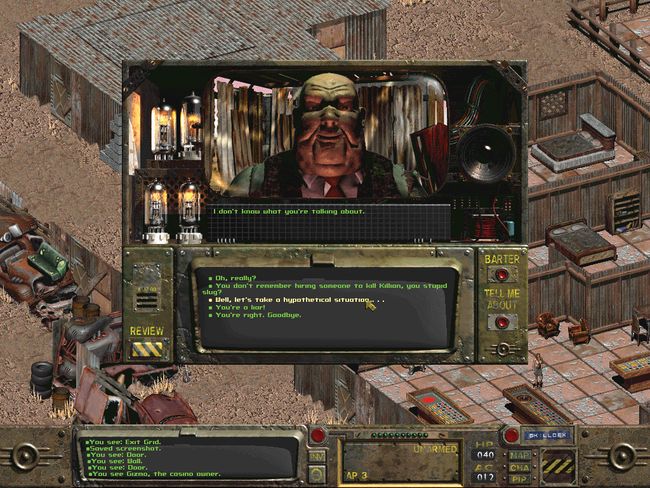
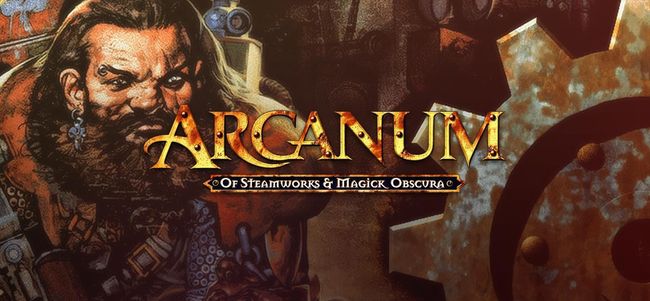
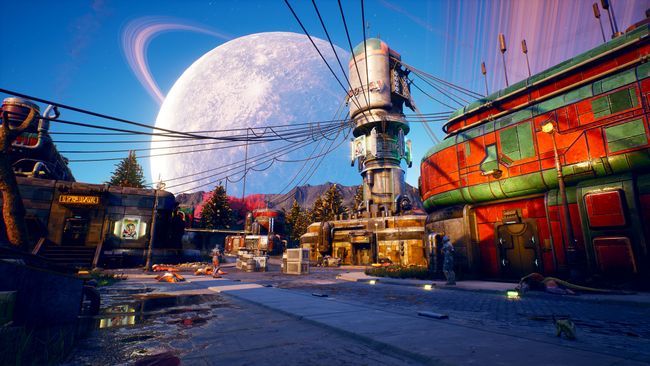
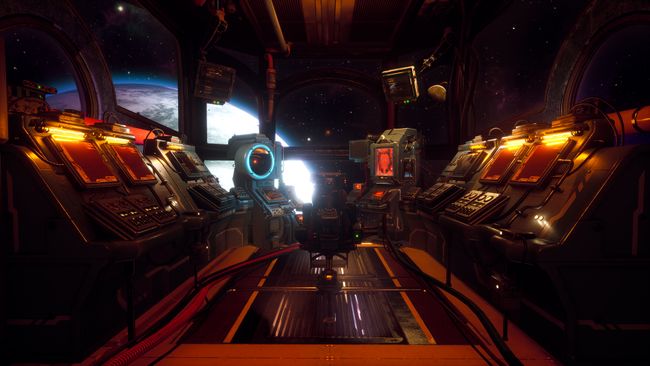
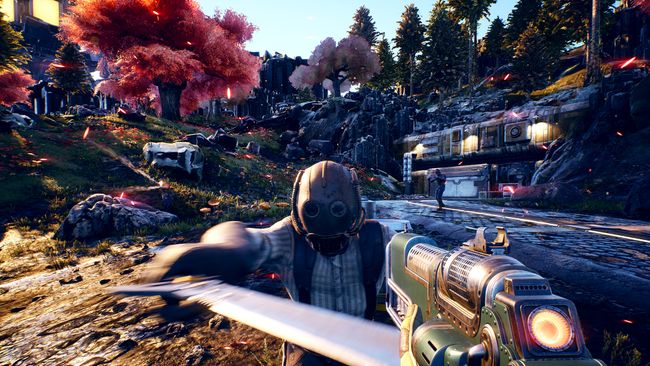
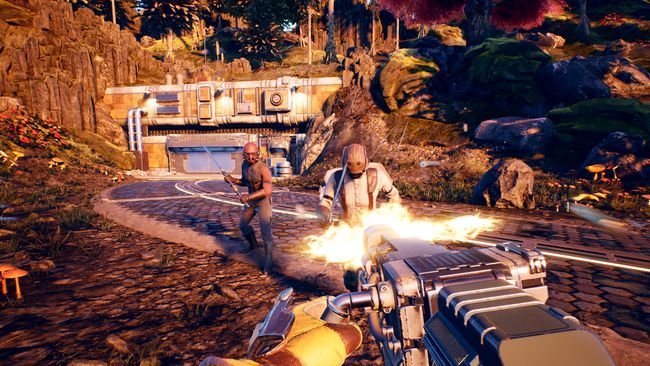
![The Year of Incline [2014] Codex 2014](/forums/smiles/campaign_tags/campaign_incline2014.png)


































































